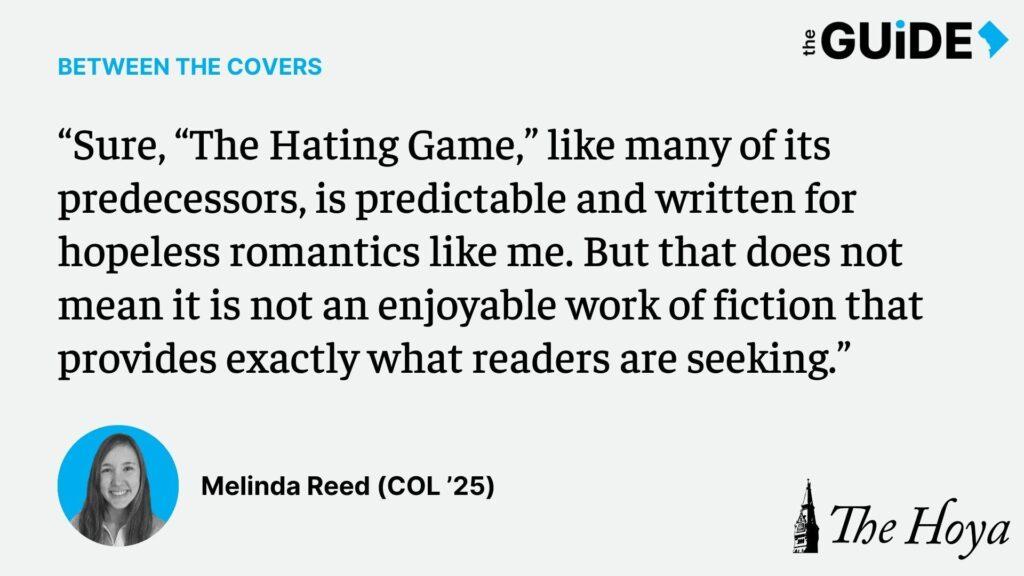I present the following summary of a book: Person A does not like Person B for some minor reason that has blossomed into full, blown-out hatred. Circumstances force them into close quarters — both figuratively and literally.
As they start to get to know each other better, Person A realizes that they actually like Person B and the original snub was a miscommunication. They ultimately give into their mutual attraction, and they admit that their hatred has transformed into…love.
I have read this book, and you probably have too.
Sally Thorne’s “The Hating Game” features this seemingly unrealistic plot line, yet the novel gives hopeless romantics exactly what they are looking for in a read. You might think I am criticizing the predictability of the romance genre, but I am not. Art that surprises us has value, but so does art that follows the same path carved into books a hundred times before.
I love contemporary romance novels, especially because they are predictable. I am countless romance titles in and I still have not tired of the aforementioned plot. Romance novel audiences actually even have a phrase for this plot now — the enemies-to-lovers trope.
The literary romance genre has seen a boom in the past few years. One of the most popular recent titles, “The Hating Game,” was developed into a 2021 film starring Lucy Hale and Austin Stowell, and directed by Peter Hutchings. This movie was a victory for all the people who, like me, think Hollywood should stop remaking things and only adapt books.
Before the movie gave us the characters of Lucy Hutton and Joshua Templeman, the book did — as is the case with many films. Its plot follows the exact progression of the one described at the beginning of this article to excellent effect. It has everything you could want: banter with sexual tension, fighting with sexual tension, confessions with sexual tension, and, of course, the enemies to lovers trope.
And to be honest, I have a theory about why this particular plot device is so popular among straight female audiences: We like to believe that all the men who have ever been mean to us were just secretly in love. The one who commented on your looks in a way that destroyed your self-confidence for the rest of middle school? In love. The one who called you a bitch at work? In love. The one who ghosted you after one date? In love.
“The Hating Game” does a great job playing to this unspoken desire of wanting to be loved in a dog-eat-dog, misogynistic world. In their first encounter, Lucy greets Josh with a big smile, to which he frowns and walks away. It is only later in the book that readers learn his reaction was the result of love at first sight.
This scene of mistaken first impressions has been done time and time again in romance novels. And why? I think it is because it is inherently hopeful, as it suggests that people are better than we think they are. Perhaps their behavior is bad, but their reasons might be good.
Cynicism is often prized as a badge of experience in literary worlds, but books like “The Hating Game” introduce us to a land where realizing you were wrong means falling in love instead of falling from grace. Given today’s state of affairs, it’s no wonder we would like to escape for a little bit.
Sure, “The Hating Game,” like many of its predecessors, is predictable and written for hopeless romantics like me. But that does not mean it is not an enjoyable work of fiction that provides exactly what readers are seeking. It is time to stop hating and start appreciating the enemies-to-lovers trope and all the hope that comes along with it.
Melinda Reed is a first year in the College. Between the Covers appears in print and online every other week.














